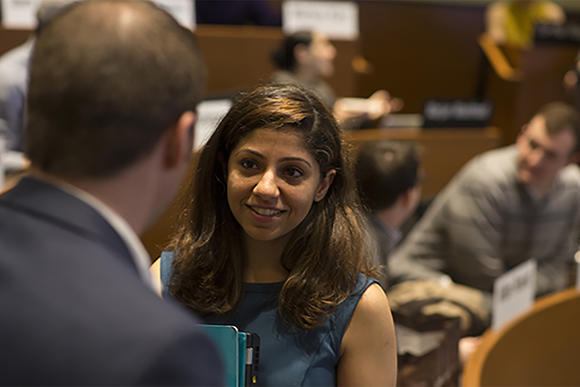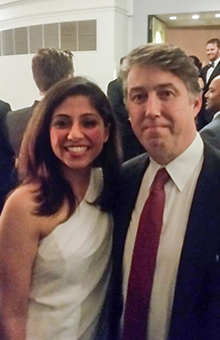Crafting a Career at the Intersection of Sustainability and Healthcare
Urvashi Bhatnagar ’18 on how the MBA for Executives program helped advance her career and enabled her to collaborate with Professor Paul Anastas.

As an alum of the Yale MBA for Executives program, I have had the unique opportunity to blend my professional interests to craft an academic experience that directly impacted my professional aspirations (and even accelerated them!). As a healthcare professional with varied experiences and an interest in sustainability, I hoped to pursue a career at the intersection of both fields. The Yale MBA has firmly placed me on that path.

Having observed healthcare from both the developed and developing world perspectives, I’ve learned that the healthcare industry, despite its altruistic motives, is not only complex and burdensome but often results in environmental degradation. Contamination of groundwater, contribution to air pollution, and various other negative outcomes are the result of high-quality care. These unintended consequences have harsh effects on population health and the outcome measures of prevention programs, reducing the effectiveness of any medical treatment that the patients receive in a clinical setting.
The sustainability track of the Yale EMBA program was the perfect avenue for me to explore professional opportunities and thought leadership at the intersection of sustainability and healthcare. Through the various opportunities and mentorship by impactful leaders across the duration of the program, I was able to design an independent study program that has extended beyond my time at Yale and has enhanced my career.
An amazing outcome of the program has been my collaboration with Professor Paul Anastas, director of the Yale Center for Green Chemistry and Green Engineering, which has extended beyond the timeframe of my degree program. Paul has been an amazing personal, academic, and professional mentor from the first week of my program. For my independent study, Paul and I conducted a market analysis on sustainability thought leadership and wrote a book to fill a gap in the market.
During our analysis, we found that there was no general readership book that explained climate change research conducted to date, its negative implications on humanity, and recent innovations in a compelling manner. While the subject matter is the focus of much general debate and scientific publication, most published work is either presented in the form of studies, textbooks, or industry-focused texts that address the issue from the standpoint of national security, supply chain logistics, etc. Like many of my classmates and colleagues, I craved a non-fiction, non-political, and non-boring book that would present the arc from science to solution, ending on a happy, inspiring note (rather than the doom and gloom that is the typical end point for most other publications in this area).
Paul and I have hopefully accomplished just that in our first book together, Climate Change for the Rational Mind. The book’s foreword is graciously provided by Dr. Jane Goodall; Archbishop Desmond Tutu contributed a blurb. With impactful voices lending their expertise to each story in the book, and meticulous citation of scientific publications wrapped in an engaging written style, the book, we hope, will inspire action, innovation, and ultimately behavior change among consumers.
We are also working on a second book together that is targeted specifically to the business community, with the goal of providing business executives and leaders with the first-in-market comprehensive framework to help them implement scientific sustainability principles into every aspect of their businesses. By using Dr. Anastas’ 12 Principles of Green Chemistry and Dr. Julie Zimmerman’s 12 Design Principles of Green Engineering as a jumping-off point, Paul and I hope to create a holistic management framework that will guide business leaders in all industries to do the right thing, right. To borrow Paul’s words, “The status quo is absurd; to not challenge it is even more absurd.”
While I’ve always felt strongly about global issues and causes, I had struggled to find a way to translate my passions into a purpose. Thanks to the Yale EMBA program and the collaboration with Paul, I was finally able to find perspectives similar to mine and the structure I needed to refine my goals and approach. From the ideation phase of book publishing to the process of publication, collaborating with Paul and various other thought leaders on this book provided me the kind of professional clarity only thousands of hours of research, writing, interviewing, and reflection can provide.
I am ever grateful for my time at Yale and will always do my part to be an active and engaged alum. In the words of Paul Anastas, our collaboration “demonstrates how projects and engagements at Yale extend beyond the timeline of a degree program, can integrate into personal and professional goals, and have a global impact.” As Deputy Dean David Bach said during my orientation week at SOM, “Yale is yours, and yours forever.”



